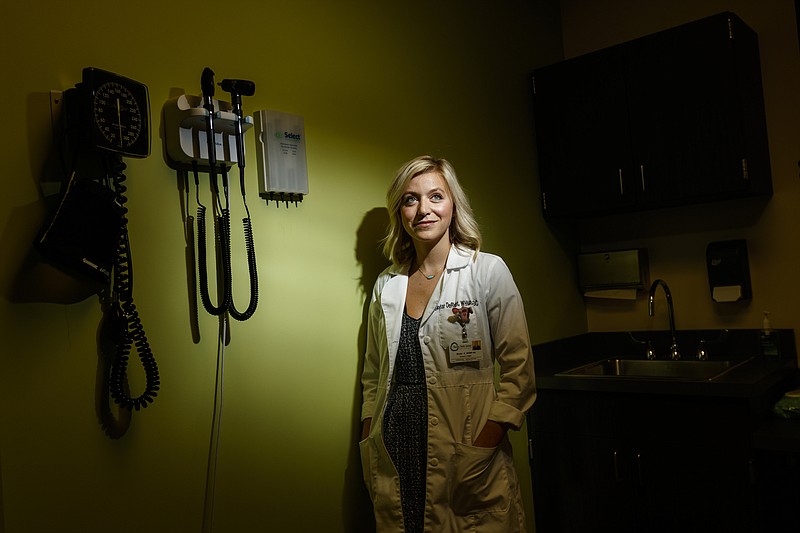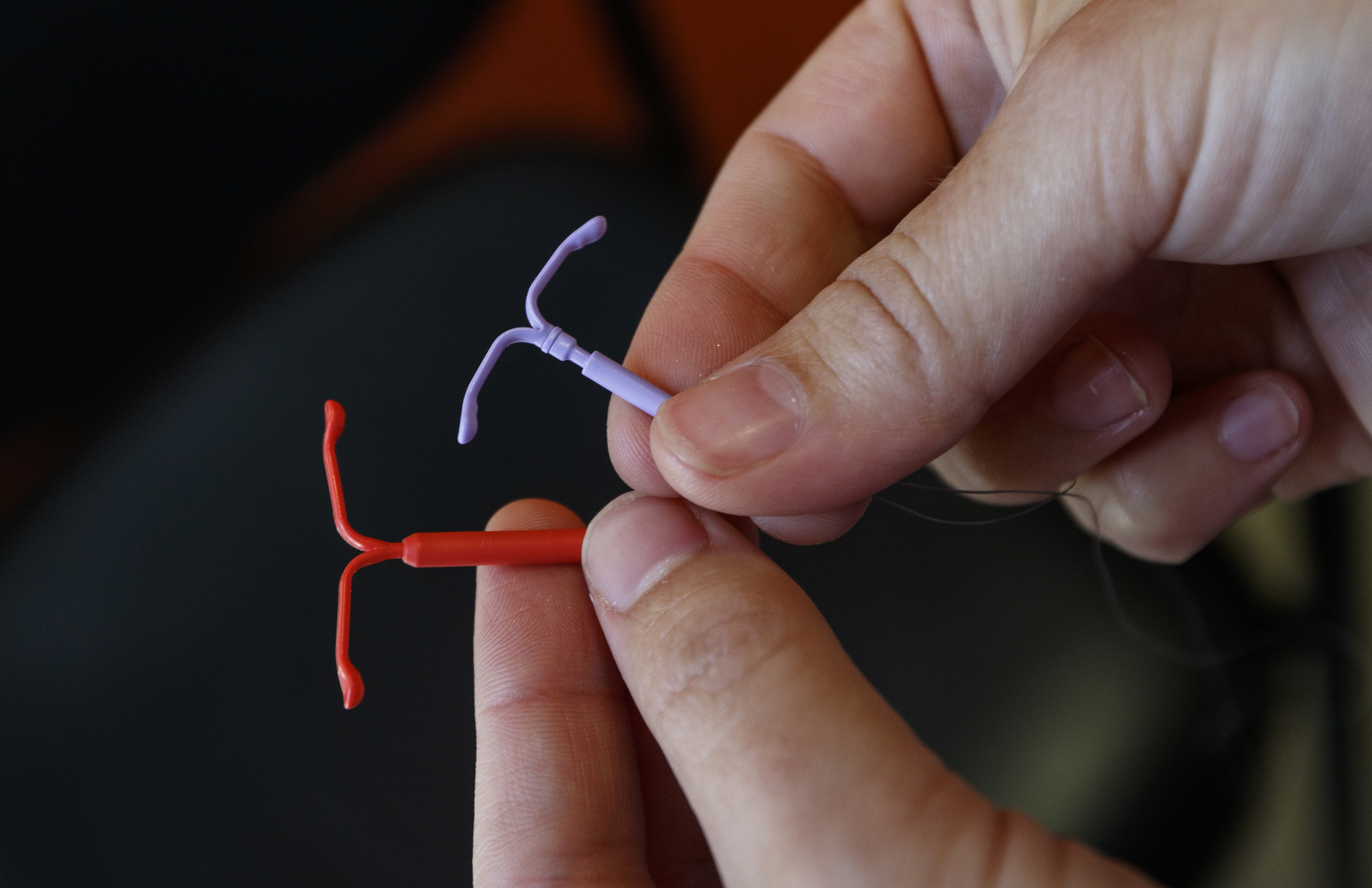Planned pregnancies are healthier than unintended pregnancies for babies, mothers, families and society, yet nearly half of pregnancies in the U.S. and Tennessee are unplanned.
A Step Ahead Chattanooga is working to change that statistic by giving women access to long-acting, reversible contraceptives, often called LARCs, regardless of their insurance status or ability to pay.
Since the nonprofit organization began less than three years ago, A Step Ahead Chattanooga, with the support of local providers, has connected more than 1,000 women with the most effective, nonpermanent birth control options. The contraceptives come in the form of intrauterine devices or an arm implant that prevents pregnancy for up to three, five or 10 years, and can be removed if a woman wants to become pregnant.
"LARCs are kind of the gold standard of birth control right now, but they're very, very expensive," said Skylar DeRight, a women's health nurse practitioner at Cherokee Health Systems' Chattanooga clinic. "A Step Ahead allows me to tell women that the best birth control is available to them."
The devices, along with the exam, insertion and potential follow-up visits, can cost more than $1,000.
Cherokee is one of 11 participating providers that treat A Step Ahead Chattanooga clients. In July, the clinic saw 22 new Step Ahead patients. That's more than one a day.
Many medical professionals favor LARCs over other birth control methods because they are safe and highly effective. But in 2012, fewer than 12 percent of U.S. women used a LARC for contraception, according to the Guttmacher Institute, a research and policy organization that studies sexual and reproductive health.
Some women prefer other forms of pregnancy prevention, but price and a lack of education among patients and providers limit access to LARCs, said Rachel Schulson, executive director of A Step Ahead Chattanooga.
"If we could remove those barriers, then everyone has an equal chance to have the most effective methods," said Schulson, who founded the program in September 2014 after learning about a similar one in Memphis.
"At the time that I heard about it, it just made so much sense to me," she said. "It was a true light-bulb moment."
In addition to providing no-cost contraceptives, A Step Ahead foots the bill for the medical exam, insertion and removal of the device should it need to come out or the woman want children. The organization also provides transportation if needed.
The program doesn't perform medical procedures, but refers women to a partner facility through a volunteer-staffed hotline or listings on its website. It reimburses providers for services not covered by insurance using donations from individuals and foundations.
DeRight said she tells her patients about A Step Ahead while discussing their plans for birth control.
"The greatest thing I see with A Step Ahead is it empowers women to just have a choice and to have all options available to them," she said.
WEIGHING THE OPTIONS
Dr. William Gist, obstetrics and gynecology program director at the University of Tennessee College of Medicine-Chattanooga, said giving women the option to plan when and how often they have kids is ideal, because those women are more likely to have healthy pregnancies.
Unintended pregnancies increase the risks for inadequate prenatal care, smoking and drinking during pregnancy, premature birth and mental health disorders for mothers and children.
"If we can make the patients more successful, then the children will be more successful," Gist said, adding that financial preparation is another important part of family planning. "Ultimately, it comes down to the woman making her choice in her goals for childbearing."
About half of unintended pregnancies result from not using protection, and the rest are due to contraceptive failure from incorrect or inconsistent use, according to a 2012 study in the New England Journal of Medicine.
In terms of effectiveness in pregnancy prevention, LARCs' only rival is sterilization, which is irreversible.
Birth control pills are the most popular contraceptives in the U.S., and although they are effective if used perfectly - taken at the same time every day - nine out of 100 women a year who use the pill will become pregnant from user error. Other factors, such as taking antibiotics, can further decrease effectiveness.
Male condoms, the most popular form of barrier protection, have an 18 percent failure rate, but unlike LARCs, protect against sexually transmitted infections such as HIV, syphilis and gonorrhea.
For this reason, opponents of LARCs argue the devices facilitate the spread of sexually transmitted infections.
Gist said it's important that sexually active individuals have regular health checkups, regardless of what birth control they choose.
CHANGING THE CONVERSATION
Schulson said nearly 99 percent of American couples of childbearing age have used birth control at some point, but many find the topic uncomfortable to discuss. Still, she said, that talk is becoming more common.
Between 2008 and 2011 the unintended pregnancy rate in the U.S. dropped significantly, from 54 per 1,000 women to 45. That was an 18 percent decline, but the rate remains much higher than many other developed countries.
Young, low-income and minority women are disproportionately more likely to have unintended pregnancies. Women in those categories also may be suspicious of using LARCs, partly because some former programs tried to limit fertility among certain groups.
Sister Song and the National Women's Health Network issued a position statement in June 2017 that addressed this fear: "We reject efforts to direct women toward any particular method and caution providers and public health officials against making assumptions based on race, ethnicity, age, ability, economic status, sexual orientation, or gender identity and expression."
Schulson emphasized that A Step Ahead's goal isn't to tell women whether to have children, but to provide LARCs to women who want them.
"What we're offering to people are methods that they normally would not be offered because of their income or insurance status," she said. "No method is for everyone, but we want everyone to have the opportunity to have it."
A large part of Schulson's time is spent providing outreach, education, and "making the whole region a little more LARC-friendly."
For example, not everyone knows that some insurance, including Tenn Care, covers LARCs.
"We've started the conversation in our community that was often not discussed," she said. "If we want to help women be pregnant when they want to be, we have to first have that conversation."
Gist said one major advantage of A Step Ahead is that it enables women to see a provider, request a LARC and acquire it in the same visit, eliminating a barrier for busy and working women who may not be able to fit in follow-up appointments.
"If they've already having problems coming in for their IUD, they're going to have problems coming in for their prenatal care," he said.
Women who live in or attend school in Hamilton, Bledsoe, Bradley, Franklin, Grundy, Marion, Meigs, McMinn, Polk, Rhea and Sequatchie counties are eligible for A Step Ahead's services.
"It's a resource that any woman that can get pregnant can utilize," DeRight said. "Just because you're in school or a single, working mom doesn't mean that you can't get the best."
Contact Elizabeth Fite at efite@timesfreepress.com or 423-757-6673.

